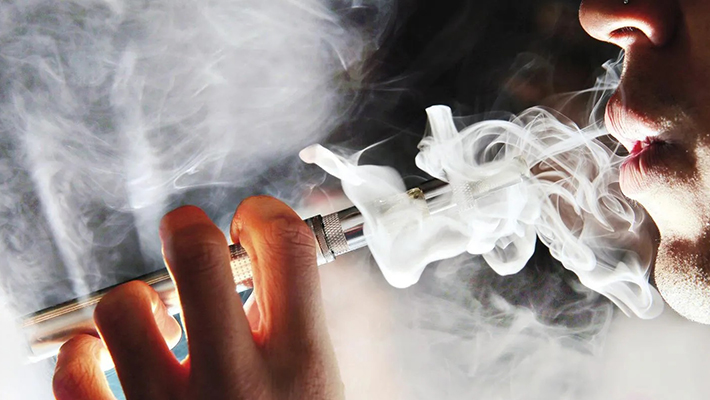
Restrictions on producing, importing, selling, distributing, storing, and transporting, as well as advertising all electronic smoking devices, remain.
The Brazilian Health Surveillance Agency (Anvisa) confirmed the continued ban on electronic smoking devices, also referred to as electronic cigarettes. This decision, taken on Friday (19/4), comes as the conclusion of a detailed regulatory process that involved the review of the rules that govern these products in Brazil, based on the most recent and reliable scientific information about such devices.
As part of the regulatory update, the manufacturing, import, sale, distribution, storage, transportation, and advertising of all types of electronic devices intended for smoking are prohibited. This makes it clear that any form of import of this equipment is prohibited, including for personal use or even carried in hand luggage by travelers.
While the new regulation maintains the ban on these commercial and import practices, it does not extend this ban to individual use of the devices. However, it is crucial to remember that, since 1996, the use of any device that produces smoke has been prohibited in all closed public spaces, as established by Law 9,294/1996.
Additionally, the recently approved resolution includes provisions for Anvisa to carry out periodic updates in the scientific literature relating to these products, whenever there is a technical-scientific justification for this. It also allows interested parties to submit new data for the Agency’s analysis, aiming for an ongoing, evidence-based assessment.
See the document with questions and answers on the regulations.
Link to the document: https://www.gov.br/anvisa/pt-br/assuntos/noticias-anvisa/2024/anvisa-atualiza-regulacao-de-cigarro-eletronico-e-mantem-proibicao/defs-p-r.pdf
Check out the essential details of the updated regulations regarding electronic smoking devices:
The complete ban on the manufacture, import, commercialization, distribution, storage, transport, and advertising of all electronic devices intended for smoking remains in force. This also includes accessories, components, and refills.
The regulation also supports the prohibition of these products entering the country by travelers, covering all forms of importation, including those carried out through accompanied luggage.
It is expressly prohibited to use any type of electronic device for smoking in closed public spaces, as established by law.
Anvisa is committed to carrying out periodic assessments of the scientific literature on the subject, whenever there is a technical and scientific justification that supports the review.
These literary reviews must be conducted independently and free of any conflicts of interest. To achieve this, Anvisa will announce public calls for the presentation of relevant scientific studies.
The agency allows interested parties to submit toxicological studies, specific scientific tests, and peer-reviewed scientific articles published in reputable journals that demonstrate the claims proposed for any electronic smoking device. These documents will be subject to rigorous technical analysis by Anvisa.
Inspection and Penalties

Failure to comply with this resolution constitutes a health infraction, subject to the penalties provided for in Laws No. 9,294 of July 2, 1996, and No. 6,437 of August 20, 1977. Applicable penalties include warning, ban, seizure, and fine, among others.
Any sale of electronic cigarettes must be immediately reported to the municipal health authorities, providing the name and address of the establishment involved.
In cases where sanitary violations are identified due to non-compliance with established standards, the municipal, state Health Surveillance or Anvisa, depending on the competence of each sphere, must promptly communicate the incident to the local Public Prosecutor’s Office, so that the relevant civil and criminal investigation can proceed.
Since 2009, Anvisa has prohibited all types of electronic smoking devices, including electronic cigarettes, as established by Resolution of the Collegiate Board (RDC) 46 of August 28, 2009. This ban covers the sale, importation, and dissemination of any type of electronic smoking device.
August 2009: Implementation of RDC 46/2009, which banned the use of electronic devices for smoking in Brazil.
2017-2020: Inclusion of the topic in the 2017-2020 Regulatory Agenda, followed by the transition to the 2021-2023 Regulatory Agenda, which defines Anvisa’s priorities for discussion.
April 2018: Holding a panel discussion on electronic smoking devices at Anvisa’s headquarters in Brasília.
June 2019: Beginning of the regulatory process to discuss electronic smoking devices.
August and September 2019: Organization of two public hearings, one in Brasília and one in Rio de Janeiro.
September 2019: Publication of an alert in response to reports of adverse effects related to the use of these devices, particularly in the United States.
2020: Anvisa commissions a systematic review and independent technical opinions.
2021: Conducting consultations aimed at the productive sector, the National Health Surveillance System (SNVS), and researchers specializing in the area.
July 2022: Approval of the Regulatory Impact Analysis Report on the matter, which recommended the holding of a public consultation – https://www.gov.br/anvisa/pt-br/assuntos/noticias-anvisa/2022/anvisa-aprova-relatorio-de-analise-de-impacto-regulatorio-sobre-dispositivos-eletronicos-para-fumar-que-inclui-todos-os-tipos-de-cigarros-eletronicos
December 1, 2023: Approval to hold a new public consultation – https://www.gov.br/anvisa/pt-br/assuntos/noticias-anvisa/2023/publicada-consulta-publica-sobre-dispositivos-eletronicos-para-fumar-que-incluem-todos-os-tipos-de-cigarros-eletronicos
12/12/2023 to 2/9/2024: Public consultation period.


